Cardiac Surgery Cost in Turkey
Unlock Exclusive Discount : Your Gateway to Premium Healthcare with Medsurge India Health Value Card.

Unlock Exclusive Discount : Your Gateway to Premium Healthcare with Medsurge India Health Value Card.

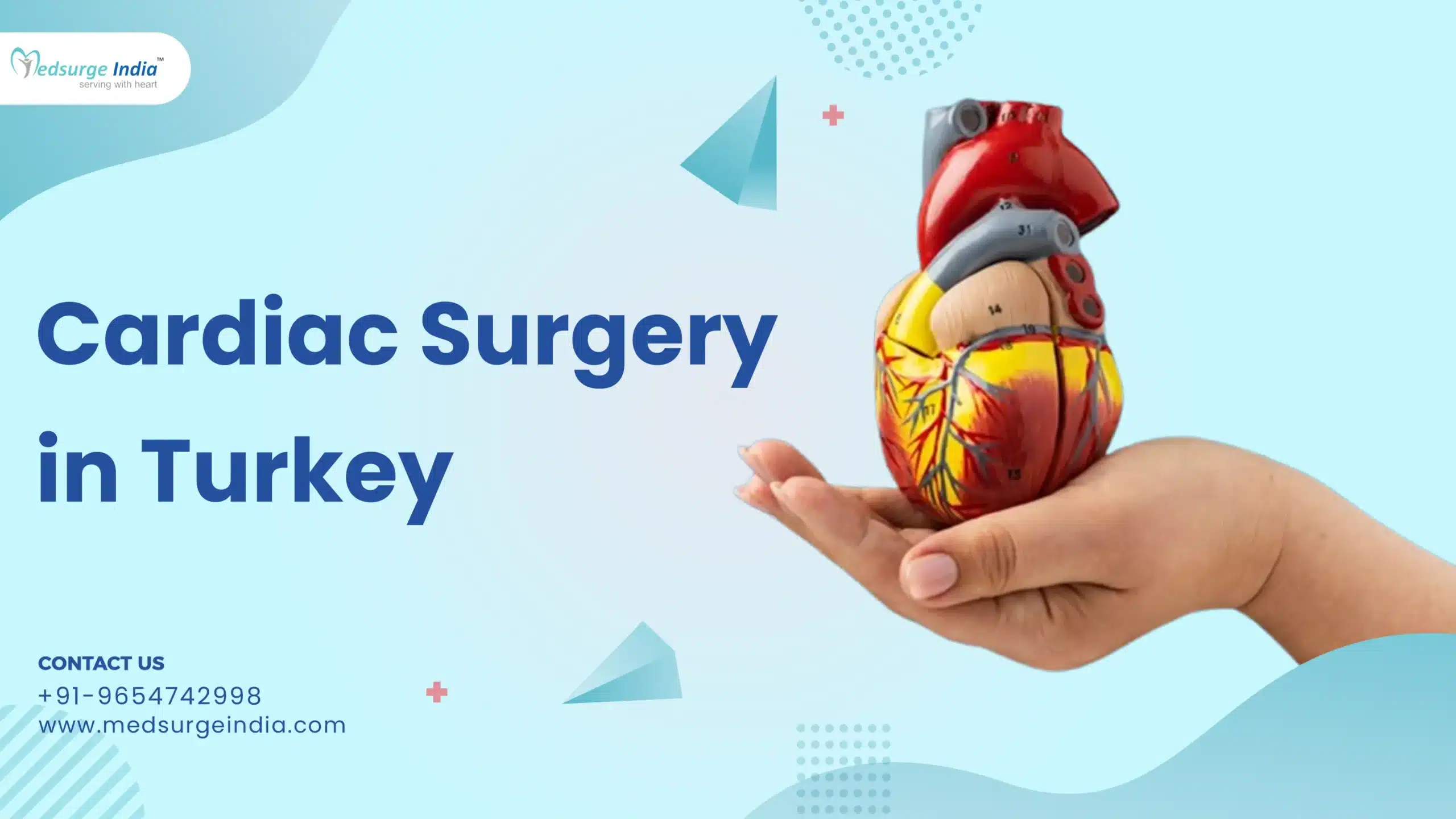
Cardiovascular surgery, often referred to as cardiac or heart surgery, includes surgical interventions that target the heart and the blood vessels that facilitate blood circulation to and from the heart. These procedures are typically conducted on patients suffering from heart disease, those with a history of heart attacks, strokes, or blood clots, as well as individuals who are at an elevated risk for these health issues.
Cardiac surgery cost in Turkey starts from 8000 USD and can go up to 15,500 USD depending on the type of surgery and the patient’s conditions. To get a better understanding of the prices for cardiac surgery, below we have listed the different types of cardiac surgery and its cost.
| Surgery | Prices |
| Coronary Artery Bypass Grafting (CABG) | $6,000 to $12,000 |
| Valve Repair or Replacement Surgery | $8,000 to $15,000 |
| Aortic Aneurysm Repair | $3,100 to $3,800 |
| Heart Transplant | $45,500 |
| Pacemaker or Implantable Cardioverter Defibrillator (ICD) Implantation | $21,000 to $24,000 |
| Maze Surgery | $23,000 to $47,000 |
| Left Ventricular Assist Device (LVAD) Implantation | $75,000 |
| Transcatheter Aortic Valve Replacement (TAVR) | $38,000 to $45,000 |
| Minimally Invasive Heart Surgery | $6,000 to $12,000 |
| Pulmonary Thromboendarterectomy (PTE) | $3000 to $5000 |
| Septal Myectomy | $5,800 |
| Pericardiectomy | $3500 to $8000 |
| Endocarditis Surgery | $2800 to $7500 |
| Atrial Septal Defect (ASD) and Ventricular Septal Defect (VSD) Repair | $4500 to $6000 |
Various factors can affect cardiac surgery cost in Turkey. Here we will discuss some of the main factors that can affect the cost of cardiac surgery in Turkey:
Individuals may require heart surgery due to various cardiac issues, such as:
– Blockages in the arteries that supply blood to the heart.
– Malfunctioning heart valves.
– Irregular heart rhythms.
– Heart failure.
Typically, heart surgery is scheduled in advance after a healthcare provider, often a cardiologist, identifies a heart condition that necessitates surgical intervention as the most effective solution.
In some cases, however, heart surgery may be needed as an emergency procedure. This can occur unexpectedly, such as during a heart attack or when a healthcare provider discovers critical blockages that pose an immediate risk to your health.
Not all heart conditions necessitate surgery. Advances in medical technology are offering new strategies for managing heart disease. Techniques like percutaneous coronary intervention (PCI) and endovascular aneurysm repair (EVAR) can minimize hospital stays and facilitate easier recovery, particularly for patients who may face greater risks associated with traditional surgery.
Cardiac surgery addresses various disorders impacting the heart and its associated blood vessels. It is capable of managing the following conditions:
Heart surgeries have become increasingly prevalent around the globe, particularly due to the rising incidence of cardiovascular diseases. Each year, millions of these procedures are conducted to address various conditions, including coronary artery disease, valve issues, and congenital heart defects. In the United States, approximately 500,000 coronary artery bypass grafting (CABG) surgeries are carried out annually, making it one of the most frequently performed heart operations.
In India, the frequency of heart surgeries is also on the rise, driven by an increasing number of patients suffering from lifestyle-related heart conditions. Major hospitals throughout the country perform over 200,000 cardiac surgeries each year, achieving a high success rate attributed to advancements in medical technology and the expertise of skilled surgeons. As public awareness of heart health improves and more individuals participate in preventive health screenings, the global demand for heart surgeries is anticipated to grow.
Given below are the different types of procedures done for individuals diagnosed with cardiac issues:
CABG is a surgical procedure to restore the supply of blood to the heart by bypassing obstructed coronary arteries with grafts obtained from other areas of the body, most commonly the leg or chest. It is one of the most frequently performed heart surgeries to address serious coronary artery disease.
This surgery entails the repair or replacement of faulty heart valves to regain normal blood flow. Surgeons can employ mechanical or biological valves based on the patient’s status and choice.
Repair of an aortic aneurysm is performed to correct a dilated or weakened portion of the aorta so that it cannot rupture and cause fatal internal bleeding. This surgery can be accomplished with open or minimally invasive methods.
Heart transplantation means replacing an ill or failing heart with a normal donor’s heart. It is generally carried out as an extreme measure in the case of patients with terminal heart failure.
It involves the implantation of devices for the control of erratic heart rhythms. A pacemaker is used to regulate a uniform beat, and an ICD will stop instant cardiac arrest by giving a shock in case of highly irregular rhythms in the heart.
Maze surgery fixes atrial fibrillation by causing a pattern of scarring tissue within the heart’s upper chambers that helps tame erratic electrical impulses and restore a normal heartbeat.
An LVAD is a surgically implanted mechanical pump that assists a failing left ventricle to pump blood properly. It may be placed as a bridge to heart transplantation or as destination therapy for severe heart failure.
TAVR is a minimally invasive procedure to replace a stenotic aortic valve without open-heart surgery, which is perfect for high-risk patients.
This technique involves small cuts and specialized tools to conduct heart operations, leading to quicker recovery periods and less pain than with conventional open-heart surgery.
PTE is a complicated procedure that excises long-standing blood clots from the pulmonary arteries, enhancing blood flow and lung function in patients with chronic thromboembolic pulmonary hypertension (CTEPH).
Septal myectomy is done to correct obstruction due to hypertrophic cardiomyopathy by excising part of the hypertrophied heart muscle, enhancing blood flow.
A pericardiectomy is the removal of some or all of the pericardium (the sac covering the heart) to ease constrictive pericarditis, a condition that prevents the heart from moving.
This surgery addresses infective endocarditis by clearing infected tissue and repairing or replacing faulty heart valves to avoid further complications.
Also Read:- Open Heart Surgery in India
Medsurge India is a reputable assistance network for individuals seeking doctors, hospitals, and specialized treatments. Our team will furnish you with a roster of licensed, esteemed, and reliable physicians and medical establishments tailored to your specific medical requirements. Furthermore, we provide a treatment plan that aligns with your financial means. Moreover, we aid patients in acquiring travel permits, medical visas, and various other services.
A: Surgeons operate on your heart using a variety of techniques. These consist of minimally invasive heart surgery, off-pump bypass surgery, and open heart surgery.
A: This procedure is known as a heart bypass or coronary artery bypass graft (CABG). In adults, it's the most common cardiac operation.
A: Electrocardiograms (ECGs), echocardiograms, stress tests, and cardiac catheterization are a few typical heart tests that physicians use to diagnose and track a variety of heart diseases.
A: Adults typically have a resting heart rate between 60 and 100 beats per minute. In general, improved cardiovascular fitness and more effective cardiac function are implied by a lower resting heart rate. A well-trained athlete, for instance, may have a resting heart rate that is more in line with 40 beats per minute.
A: Adults with a resting pulse rate of 120 beats per minute (BPM) would be deemed to have a high heart rate, whilst those aged 15 and above typically have a heart rate between 60 and 100 BPM. The number of times your heart beats per minute (BPM) is known as your pulse rate, or heart rate.
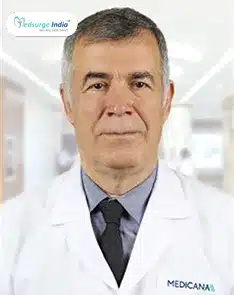
Pediatric Cardiologist
Senior Consultant
43+ Years
Medicana Bursa Hospital, Ankara
View Doctor
Pediatric Cardiologist
Senior Consultant
43+ Years
Medicana Bursa Hospital, Ankara
View Doctor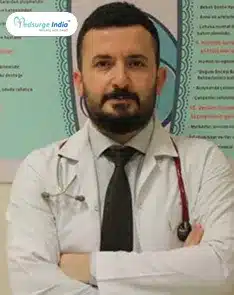
Pediatric Cardiologist
Consultant
20+ Years
Medicana Bursa Hospital, Ankara
View Doctor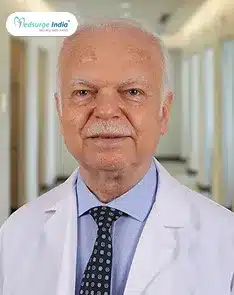
Pediatric Cardiologist
Senior Consultant
46+ Years
Medicana Bursa Hospital, Ankara
View Doctor
Interventional Cardiologist
Consultant
41 years of experience
Batigoz Eye Hospital Balcova
View Doctor
Cardiac Surgeon
Consultant
25 years of experience
Derindere Hospital, Istanbul
View DoctorPediatric Cardiac Surgeon
Consultant
40 years of experience
Can Hospital, Istanbul
View DoctorCardiac Surgeon
Consultant
25 years of experience
Can Hospital, Istanbul
View DoctorCardiac Surgeon
Associate Professor
15 years of experience
Yeditepe University Healthcare Institutions, Istanbul
View DoctorCardiac Surgeon
Consultant
20 years of experience
Ozel Saglik Hastanesi
View Doctor







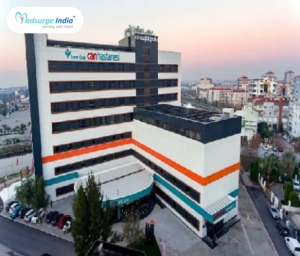
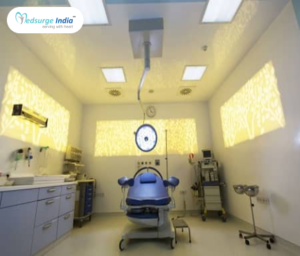
By using our site, you agree to our Terms and Conditions, Privacy Policy and Refund Policy. Medsurgeindia does not provide medical advice, diagnosis, or treatment. The information provided on this site is designed to support, not replace, the relationship that exists between a patient/site visitor and his/her existing physician. We also Accept International Payments.

Copyright © 2025 NSM ONLINE SOLUTIONS PRIVATE LIMITED. All rights reserved.